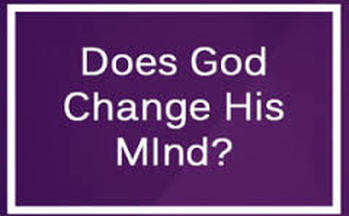
Genesis 1:31 (NKJV) Then God saw everything that He had made, and indeed it was very good. So the evening and the morning were the sixth day.
The Bible says, in many places, that God never changes.
Numbers 23:19 (NKJV) "God is not a man, that He should lie, Nor a son of man, that He should repent. Has He said, and will He not do? Or has He spoken, and will He not make it good?
James 1:17 (NKJV) Every good gift and every perfect gift is from above, and comes down from the Father of lights, with whom there is no variation or shadow of turning.
Hebrews 13:8 (NKJV) Jesus Christ is the same yesterday, today, and forever.
Malachi 3:6 (NKJV) "For I am the LORD, I do not change; Therefore you are not consumed, O sons of Jacob.
The people who say God does change His mind point to scripture too.
Genesis 6:6 (NKJV) And the LORD was sorry that He had made man on the earth, and He was grieved in His heart.
Jeremiah 18:7-10 (NKJV)7 The instant I speak concerning a nation and concerning a kingdom, to pluck up, to pull down, and to destroy it,8 if that nation against whom I have spoken turns from its evil, I will relent of the disaster that I thought to bring upon it.9 And the instant I speak concerning a nation and concerning a kingdom, to build and to plant it,10 if it does evil in My sight so that it does not obey My voice, then I will relent concerning the good with which I said I would benefit it.
Jonah 3:10 (NKJV) Then God saw their works, that they turned from their evil way; and God relented from the disaster that He had said He would bring upon them, and He did not do it.
God is not one to cause confusion so I needed to make sense out of what appears, on the surface, to be very real contradictions in my perception and belief of God’s character.
God Is Immutable
It’s clear from scripture that God is immutable. The definition of immutable is; is unchanging over time or unable to be changed. We know that God has always existed and will exist forever. He has no beginning and no end.
Psalm 90:2 (NKJV) Before the mountains were brought forth, Or ever You had formed the earth and the world, Even from everlasting to everlasting, You are God.
Isaiah 44:6 (NKJV) "Thus says the LORD, the King of Israel, And his Redeemer, the LORD of hosts: 'I am the First and I am the Last; Besides Me there is no God.
Revelation 1:8 (NKJV) "I am the Alpha and the Omega, the Beginning and the End," says the Lord, "who is and who was and who is to come, the Almighty."
Scripture also tells us that God is perfect and omniscient.
Psalm 18:30 (NKJV) As for God, His way is perfect; The word of the LORD is proven; He is a shield to all who trust in Him.
Isaiah 40:13-14 (NKJV)13 Who has directed the Spirit of the LORD, Or as His counselor has taught Him?14 With whom did He take counsel, and who instructed Him, And taught Him in the path of justice? Who taught Him knowledge, And showed Him the way of understanding?
Since God is immutable, omniscient, and perfect He has no reason to ever change. The fact is that God knows all things and he has known it all forever so He never needs to change His mind or anything else.
1 John 3:16-20 (NKJV)16 By this we know love, because He laid down His life for us. And we also ought to lay down our lives for the brethren.17 But whoever has this world's goods, and sees his brother in need, and shuts up his heart from him, how does the love of God abide in him?18 My little children, let us not love in word or in tongue, but in deed and in truth.19 And by this we know that we are of the truth, and shall assure our hearts before Him.20 For if our heart condemns us, God is greater than our heart, and knows all things. (Bold mine)
To say that God would actually change his mind would imply that God, who is supposed to have already known everything, decided to act in a way that was different from what He always knew He would do. So, how is he really changing his mind if he decided to do something all along that only appears (to us) that He changed his mind?

Since God is really beyond our ability to fully comprehend the Holy Spirit enabled men to write in a manner that we can understand. The technical term for this way of talking about God is anthropomorphism, which is the attribution of human traits, emotions, and intentions to non-human entities.
Here is what Baker’s Evangelical Dictionary of Biblical Theology says about anthropomorphism.
The use of human terminology to talk about God is necessary when we, in our limitations, wish to express truths about the Deity who by his very nature cannot be described or known. From biblical times to the present, people have felt compelled to explain what God is like, and no expressions other than human terms are able to convey any semblance of meaning to the indescribable. Thus, in Genesis alone God creates ( 1:1 ), moves ( 1:2 ), speaks ( 1:3 ), sees ( 1:4 ), divides ( 1:4 ), places ( 1:17 ), blesses ( 1:22 ), plants ( 2:8 ), walks ( 3:8 ), shuts ( 7:16 ), smells ( 8:21 ), descends ( 11:5 ), scatters ( 11:8 ), hears ( 21:17 ), tests ( 22:1 ), and judges ( 30:6 ). For example, the Bible speaks of the “arm of God” (Deuteronomy 5:15 (NKJV)15 And remember that you were a slave in the land of Egypt, and the LORD your God brought you out from there by a mighty hand and by an outstretched arm; therefore the LORD your God commanded you to keep the Sabbath day) with respect to His power while Psalm 50:10 says, “[God] owns the cattle on a thousand hills.” We know, however, that this is metaphorical language. The Bible isn’t trying to tell us that God is a cosmic cowboy who is in the cattle business. That God owns the cattle on a thousand hills is a human way of describing the vast riches that our Creator possesses. This language is perfectly useful to describe God’s activity among us;
When we understand that this is the only way we can begin to know what God is like we can then see how from our human viewpoint God seems to change His mind, but He is only presented to us that way so that we can relate to an omniscient God.
God's Declarations Are Conditional or Unconditional
In addition to knowing that scripture is written in a way for us to better understand God from our human perspective, we must make a distinction between conditional declarations and unconditional determinations of God.
The declaration to destroy Nineveh in forty days was conditional one.
Jonah 3:1-4 (NKJV)1 Now the word of the LORD came to Jonah the second time, saying,2 "Arise, go to Nineveh, that great city, and preach to it the message that I tell you."3 So Jonah arose and went to Nineveh, according to the word of the LORD. Now Nineveh was an exceedingly great city, a three-day journey in extent.4 And Jonah began to enter the city on the first day's walk. Then he cried out and said, "Yet forty days, and Nineveh shall be overthrown!"
The declaration was conditioned on Nineveh's repentance. We know this was the condition because they repented, and God didn’t destroy the city.
Jonah 3:10 (NKJV) Then God saw their works, that they turned from their evil way; and God relented from the disaster that He had said He would bring upon them, and He did not do it.
In this instance God was consistent. He was going to judge Nineveh but Nineveh repented. Since God is holy He had mercy on the city because of they repented. Consequently what appears, to us to be a change of mind is, on the other hand, entirely consistent with His character. God will never do anything out of character if He did He wouldn’t be God.
The declaration to David about his family was unconditional
2 Samuel 7:16 (NKJV) And your house and your kingdom shall be established forever before you. Your throne shall be established forever." ' "
There were no conditions expressed or implied in this declaration. No matter what David did or did not do, the word of the Lord would come to pass, and we know that David was far from perfect.
God also makes some declarations that He will act in accordance with our choices. Notice the conditional words but and if;
Jeremiah 18:7-8 (NKJV) The instant I speak concerning a nation and concerning a kingdom, to pluck up, to pull down, and to destroy it,8 if that nation against whom I have spoken turns from its evil, I will relent of the disaster that I thought to bring upon it.
Ezekiel 33:13-16 (NKJV)13 When I say to the righteous that he shall surely live, but he trusts in his own righteousness and commits iniquity, none of his righteous works shall be remembered; but because of the iniquity that he has committed, he shall die.14 Again, when I say to the wicked, 'You shall surely die,' if he turns from his sin and does what is lawful and right,15 if the wicked restores the pledge, gives back what he has stolen, and walks in the statutes of life without committing iniquity, he shall surely live; he shall not die.16 None of his sins which he has committed shall be remembered against him; he has done what is lawful and right; he shall surely live.
At one time we were all enemies of God due to our sin, and He warned us what would happen if there was no change
Romans 6:23 (NKJV) For the wages of sin is death, but the gift of God is eternal life in Christ Jesus our Lord.
When we repented and trusted Christ for salvation it appears that God “changed His mind” about us, but He acted in accordance to our choice and, saved us. It would be contrary to God’s character to not punish us had we continued in sin, so it would be contrary to His character to punish us after we repent. Does our change of heart mean that God changes? No, if anything, our salvation points to the fact that God does not change, because had He not saved us for the sake of Christ, He would have acted contrary to His character.
When a person repents the relationship with God changes because of the person’s choice to accept the grace of God. Just as in the case of Nineveh, “I’m going to judge you,” and then (after they repent) refuse to judge them may look like God changed His mind. In reality, God was simply staying true to His character. He loves mercy and forgives.
So, what we’re seeing is God changing his mind from our perspective, but from the eternal perspective he did not change His mind about the penalty of sin. He already knows what we will choose so He’s not surprised by our choices. He does’t have to adapt to our mistakes or our plans.
Ephesians 1:11 (NKJV) In Him also we have obtained an inheritance, being predestined according to the purpose of Him who works all things according to the counsel of His will,
The discourse with Abraham about Sodom and Gomorrah is not an example of God changing His mind either. Those who use the example of God saying that He would not destroy the cities if differing numbers of righteous people are found there is a very weak argument of God changing His mind. Abraham first asked God if He would destroy the cities if there were 50 righteous there and God said no. Abraham kept reducing the number of righteous until he reached 10 and at each iteration God said no, He would not destroy the cities. Abraham stopped at 10, and God said He would not destroy the cities if there were 10 righteous. We know the end of the story and that there were only 4 righteous people in Sodom (and one of those didn’t make it far) so He destroyed Sodom, Gomorrah and the other cities of the plain. Does anybody really believe that God didn’t already know that there were not 10 righteous people in these cities? What we have is an example of God talking with a friend and engaging him in conversation not an example of God changing his mind.

People often ask whether prayer can change God’s mind. If God has determined something do you really think that He is going to change His mind? If you know that God has not answered a request do you really think you can talk Him into doing it without you doing something different? If when you change or make a different choice, and the prayer is answered it proves my point that you have made a different choice. God has not changed His mind you are the one that has changed and come into God’s will for you. God knows everything, and He has known it forever. He’s known the end from the beginning. He never changes and never changes His mind.
Isaiah 46:10 (NKJV) Declaring the end from the beginning, And from ancient times things that are not yet done, Saying, 'My counsel shall stand, And I will do all My pleasure,'

 RSS Feed
RSS Feed